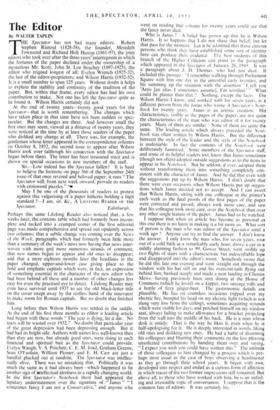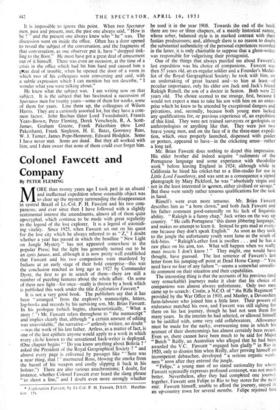The Editor
By WALTER TAPLIN
THE Spectator has not had many editors. Robert Stephen Rintoul. (1828-58); the founder, Meredith Townsend and Richard Holt Huttop (1861-97), the joint editors who took over after the three years interregnum in which the fortunes of the paper declined under the ownership of a mysterious Mr. Scott; John $t. Loe Strachey (1897-1925), the editor who reigned longest of all; Evelyn Wrench (1925-32), the last of the editor-proprietors; and Wilson Harris (1932-52). It is a small number to span 125 years. Without doubt it helps to explain the stability and continuity of the tradition of the paper. But, within that frame, every editor has had his own contribution to make. Not one has left the Spectator quite as he found it. Wilson Harris certainly did not.
At the end of twenty years—twenty good years for the Spectator—that is worth remembering. The changes which have taken place in that time have not been sudden or spec- tacular. But the changes are there. And however small the first ones may seem, viewed at a distance of twenty years, they were noticed at the time by at least those readers of the paper who disliked any change at all. There was, for example, the gentleman whose letter appeared in the correspondence columns on October 8, 1932, the second issue to appear after Wilson Harris took over (although his connection with the Spectator began before then). The letter has been treasured since and is shown on special occasions to new members of the staff.
Sir,—Low indeed has the Spectator fallen! It is hard to believe the footnote on page 366 of the September 24th issue of that once revered and beloved paper; it runs " The Spectator will, from next week onward, provide its readers with crossword puzzles." 'In May .I be one of the thousands of readers to protest against this vulgarising of a paper hitherto holding a high standard ?—I am, sir, &c., A LIFELONG READER OF THE Spectator. Edinburgh.
Perhaps this same Lifelong Reader also noticed that, a few weeks later, the contents table which had formerly been incom- plete and tucked into a cramped corner of the first editorial page was made comprehensive and spread out opulently across two columns; that a subtle change was coming over the News of the Week, paragraphs which had formerly been little more than a summary of the week's news now having that news inter- woven with more and more numerous strands of comment; that new names began to appear and old ones to disappear; and that a mere eighteen months later the headlines in the paper changed, upper-and-lower case giving place to the bold and emphatic capitals which were, in fact, an expression of something essential in the character of the new editor who had been behind alt these and a number of other changes less easy for even the practised eye to detect. Lifelong Reader may even have survived until 1937 to see the old black-letter title on the cover swept away by the restless hand of the innovator to make room for Roman capitals. But no doubt that finished him.
Lone before then Wilson Harris was settled in the saddle. At the end of his first three months as editor a leading article had begun with these words " The year is dying, let it die. No tears will be wasted over 1932." No doubt that particular year of the great depression had been depressing enough. But it had had its bright side. Authors with names less well-known then than they are now, but already good ones, were rising to such financial and spiritual bait as the Spectator could provide. Evelyn Waugh, V. S. Pritchett, C. E. M. Joad, Graham Greene, Sean O'Faolain, William Plomer, and E. H. Carr are just a handful plucked out at random. The Spectator was intellec- tually alive. There was no mistaking that. Politically it was much the same as it had always been—which happened to be another sign of intellectual alertness in a rapidly changing world. In the first Spectator's Notebook there had appeared the lapidary understatement over the signature of ' Janus " " I sometimes fancy I am not a Conservative," and anyone who went on reading that column for twenty years could see that. the fancy never died.
Who is Janus ? A belief has grown up that he is Wilson Harris. It so happens that I do not share that belief, but let that pass for the moment. Let it he admitted that those curious persons who think they have established some sort of identity here can produce their evidence. TI,e hest students of this branch of the Higher Criticism can point to the paragraph which appeared in the Spectator of January 28, 1949. It was a . paragraph about J. H. Thomas. who had just died. It included this passage: "I remember walking through Parliament Square with him one day in the unrestful early twenties, and his summing up the situation with the assertion ' I tell you 'Arris [an alias I sometimes assume]. I'm terrified.' " What could be plainer than that ? Nothing, except the facts. The Wilson Harris I know, and worked with for seven years. is a different person from the Janus who wrote A Spectator's Note- book for twenty years. Janus- is an artistic. creation. His characteristics, visible in the pages of the paper, are not quite the characteristics of the man who was editor of it for twenty years. Many of them are similar. None of them are quite the same. The leading article which always preceded the Note- book was often written by Wilson Harris. But the difference between the style of the leader and the style of the Notebook is undeniable. In fact the contents of the Notebook were deliberately Janusised. Some members of the Spectator staff, and some of its helpful readers too, know that Janus sometimes (though not often) adopted outside suggestions as to the items to appear in his Notebook. But he seldom, if ever, adopted them without transforming them into somethin., completely con- sistent with the character of Janus. And he did that even with the suggestions put up by Wilson Harris. l don't doubt that there were even occasions when Wilson Harris put up sugges- tions which Janus decided not to accept. And I can assert that Wilson Harris, sitting with one colleague at the printer's each week as the final proofs of the first pages of the paper were corrected and passed, always took more care, and saw that his colleague took more care, over the Notebook than over any other single feature of the paper. Janus had to be watched.
I suppose that when an article has become as personal as this one there is no harm in making it a hit more so. What sort of person is the man who was editor of the Spectator until a week ago ? Anyone can try to find the answer. I don't know the answer. I only know the man who, for seven years. rose out of a cold bath at a remarkably early hour, drove a car in a mildly alarming fashion to 99, Gower Street, went swiftly up two flights of stairs with a characteristic but indescribable lope and disappeared into the editor's room. Somebody swore that he did this late one evening and went straight out through the window with his hat still on and his overcoat-tails flying out behind him, banked steeply and made a neat landing in Chenies Mews—having previously been seen dining at the House of Commons (which he loved) on a kipper, two sausage rolls and a bottle of fizzy ginger-beer. The gastronomic details are plausible. He has on countless occasions tripped over my electric fire, bumped his head on my electric light (which is not slung very low from the ceiling), sometimes acquiring wounds which were visible for days, and perched himself on my window seat, always failing to make allowance for a bracket projecting from the wall into the middle of his back. He is a man whoso desk is untidy. That is the way he likes it, even when he is half-apologising for it. He is deeply interested in words, liking old ones and disliking new ones. He had a habit of disarming his colleagues and-blunting their comments on the less pleasing unsolicited contributions by handing them over and saying, " I expect you wish you could have written this." The attitude of those colleagues to him changed by a process which is per- haps most usual in the case of boys observing a headmaster as they go through their school years. It began with awe, developed into respect and ended as a curious form of affection in which traces-of the two former impressions still remained. But above all, to those who have, worked with him, he is an unfail- ing and irresistible topic of conversation. I suppose that is the common fate of editors. It was certainly his. It is impossible to ignore this point. When two Spectator men, past and present, met, the past one always said, " How is he ? " and the present one always knew who " he " was. The discussion went on inside the office. Often has a door opened to reveal the subject of the conversation, and the fragments of that conversation, as one observer put it, have " dropped tink- ling to the, floor." He must have got a great deal of amusement out of it himself. There was even an occasion, at the time of a crisis in the office which had hit him hard and caused him a peat deal of trouble, when he opened the door of a room in which two of his colleagues were conversing and said, with a subtle expression which I can mention but not describe, " I wonder what you were talking about."
He knew what the subject was. I am writing now on that subject. It is the subject that has fascinated a succession of Spectator men for twenty years—some of them for weeks, some of them for years. Line them up, the colleagues of Wilson Harris. They are a curiously assorted lot, but they have a com- mon factor. John Buchan (later Lord Tweedsmuir), Francis Yeats-Brown, Peter Fleming, Derek Verschoyle, R. A. Scott- James. Graham Greene, Frank Pakenham (tcow Lord Pakenham), Frank Singleton, H. E. Bates, Goronwy Rees, W. J. Turner, James Pope-Hennessy, Edward Hodgkin. Some I have never met. Some are dead. But they all worked with him, and I dare swear that none of them could ever forget him.



































 Previous page
Previous page